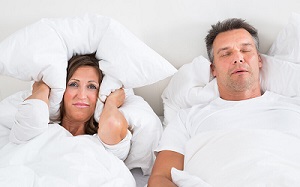
Sleeping disorders are a common problem among Canadians. Sleep apnea is a potentially dangerous sleep disorder affecting more than 18 million people in north America, according to the National Sleep Foundation. Anyone can be affected by this condition, which causes you to momentarily stop breathing during your sleep.
Although snoring is widely thought to be the cause of sleep apnea, it is actually one of the main symptoms of the condition. The cause is when the muscles in the back of the throat relax, resulting in the narrowing of your airway as you breathe. This prevents you from getting enough air into your lungs, lowering the levels of oxygen in your blood. The brain realizes it’s being starved of oxygen, so it wakes you up briefly to breathe again. Most patients are unaware of being woken up, even though you might choke or gasp for breath. This can happen a few times per hour or up to 30 times or more, which prevents you from getting deep, restful sleep.
Some of the risk factors for developing sleep apnea include obesity, older age, family history, male gender, having a thicker neck circumference, use of alcohol, sedatives or tranquilizers, smoking and nasal congestion.
It’s important not to let sleep apnea go untreated, and one of the most common ways to address a mild to moderate condition is through the creation of a dental appliance. There are two types of devices dentists supply for sleep apnea:
While you can buy over-the-counter mouth guards for sleep apnea, they aren’t usually very effective. These devices may stop you snoring but they won’t address the cause of your sleep apnea, which means you could develop complications later in life. You’ll get a much higher quality by having a device specially made to fit you at a reputable dental office. Other treatment options include getting a CPAP machine, and, in some cases, doctors recommend both CPAP and a dental device. Positional therapy helps you to avoid sleeping on your back, weight loss can reduce the snoring and nasal decongestion through medication or surgery might also help.
Many patients find a custom dental device more comfortable than a CPAP machine, which causes dry, itchy nostrils from the air pressure affecting their sinuses. The equipment is awkward and easily disconnected during sleep, and inconvenient when you have to travel.
You’re an ideal candidate for a dental appliance if you:
Dental devices also have a few disadvantages, particularly when you first start wearing them. Jaw pain and soreness, dry mouth and potential damage to your jaw position, bite or former dental work can be problematic, which is another reason why your device should be custom made and fitted by a qualified dental practitioner.
When you don’t sleep well, you risk a number of other problems developing. These include difficulty concentrating and function, driving problems, mood changes, high blood pressure, stroke and heart disease, chronic fatigue, memory problems, headaches, dry mouth and a sore throat after sleeping with your mouth open. Of course, the most significant of these is the fact that you can stop breathing for long enough to die during your sleep, so it’s vital to get your sleep apnea attended to.
For more information on treating sleep apnea with dental appliances, please schedule an appointment with our dentist in Scarborough at 416-267-4661, or click here to book online.
Do you ever feel nervous about dentist appointments? Rest assured: we cater to nervous and anxious patients in a gentle and considerate manner. Call us now to schedule a free consultation!